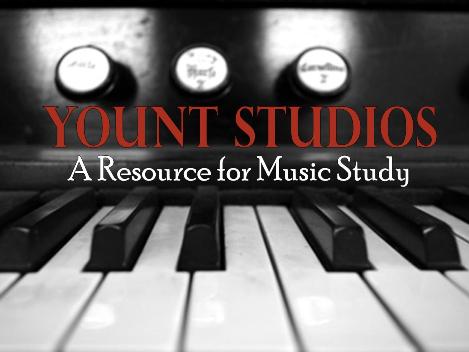Current Christian music that is loosely termed ‘contemporary’ is really derived from well-tested American pop, light rock, Broadway and musical theatre, or gospel/country styles. These styles all have merit in themselves, and are ideally suited to their original intended audiences. This music was, and is still, rooted in the concept of profit: it must garner its producers the highest possible return on an investment. Obviously, the use of some of these styles in evangelism and religious television is highly effective. But that begs the question: how does it fit into a Reformed and biblical worldview, or into a biblical service of worship?
Now, for the classically trained musician, there are currently few choices in the church music field. It’s not a large market, especially in conservative and evangelical churches. Further, it is fraught with landmines, often resulting in young musicians stomping out of the church in a huff. Is there another way forward?
A young musician working on a degree in music should be aware of entering into music as a vocation in a church. Perhaps in some cases, that musician has a high calling: a desire to teach average Christians what real music sounds like, and cram it down their throats. Because of the volatile nature of music’s affect on the human psyche, emotions, and spiritual life, no musician need enter music ministry unless they have first of all dispensed with all such notions.
What we have in the current ‘marketplace’ of music for churches is a widely divergent stylistic spread. Given no clearly available vocational guidelines, composers can easily fall prey to thinking along the lines of two extremes:
1. High art music that caters to the rather elitist congregant, often confusing ministry with aestheticism.
2. Current music that derives heavily from the pop world, so that its major appeal becomes immediate recognition and gratification.
What is now needed is a generation, a movement inside churches, to reform worship music anew. To do that, Christian composers will need to be ready to 'give an answer for what you believe' at least in terms of vocational convictions. Many of us agree, there are no clearly lined out biblical guidelines. But practically and doctrinally speaking, we need to operate from a principled, biblically acceptable paradigm.
One such paradigm is offered by Nicholas Wolterstorff, former professor of philosophy at Yale, in his landmark book Art in Action: Towards a Christian Aesthetic.Any composer may derive his own set of tools for achieving what I will call "aesthetic merit." In the case of painters, writers, and sculptors, there are universally held elements of aesthetic merit. Wolterstorff describes them like this:
a. Unity
b. Diversity
c. Controlled but profound intensity in the pursuit of a and b
Well-formed composers are needed for today's Reformed and biblically orthodox churches. We hunger for a musical life that is not alien to true aesthetic merit. Indeed, once a given composer has mastered his material well enough, he might produce useful (not merely utilitarian) music, without compromising unity or diversity in pursuit of intensity of expression, above.
Indeed, the inexperienced musician who is a candidate for choral director, instrumentalist, worship leader, or a combination of these, must approach his vocational life as a shepherd who is being called into the ministry of calling together, gently prodding, and teaching a flock of ‘sheep.’ That takes months, years, and ultimately a lifetime of humble service.
Musical service in the true Church begins always with one concept: it’s not about you at all. It’s about the sheep, and your calling to nurture them in true, saving faith. Don’t even think of entering into this ministry if you have first of all neglected the core of your calling. Get in touch with God, and get in the middle of the sheep, hear how they express themselves, and be a student of their habits. Once you get a good picture of what they like or do not like, go pray about them, and your choices and how they might affect them. Spend months or years preparing technically, so you can write truly well crafted music, which may qualify as meritorious. Then you will have contributed to the nurture of the sheep. Along the way, you may be rewarded. Or you may be ignored and rejected. Get ready for either.
Whether it is working in maintenance, administration, teaching children, playing an instrument, or singing, we are called to serve the God of the universe with our hands open, ready to receive his direction. In a way, musicians have an advantage, however. We bring something that is immediately arresting and even refreshing to the dreary world of work-weary, suffering Christians who come weekly for worship and the sacraments. We bring a song with aesthetic merit based on our assessment of the spiritual condition of the sheep. Hopefully they hum along their way, a song that encourages them to go into the office or factory for another week. That is the reason we are in God’s presence in his sanctuary, to give the song, gently lead it, and nurture the singers who take it along the way. We can do nothing greater if we simply do that.

No comments:
Post a Comment